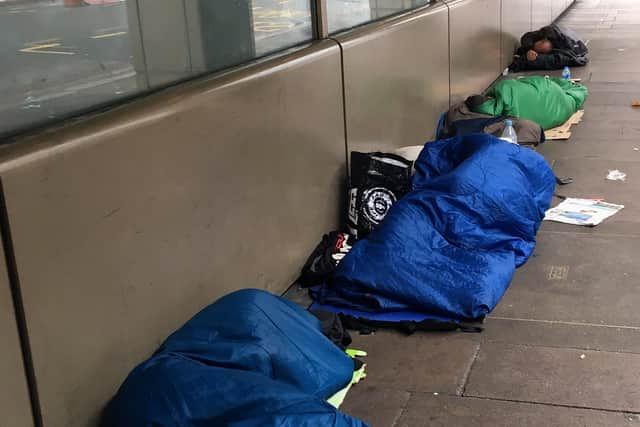Early intervention for potential homeless people in Scotland necessary amid 'horrific' experiences, charity says
This article contains affiliate links. We may earn a small commission on items purchased through this article, but that does not affect our editorial judgement.
Crisis, which works to tackle homelessness, has carried out analysis that demonstrates how some people in Scotland are being told they are not able to be helped by local authorities before they are officially homeless.
The paper presents several real-world examples of individuals told they are unable to access support until they have an eviction notice.
Advertisement
Hide AdAdvertisement
Hide Ad

This included two different elderly tenants being forced out of their home due to the landlord wishing to either sell or live in the property.
Others were told by council workers they would be forced into poor quality temporary accommodation, while some landlords were failing to keep properties maintained properly, leaving tenants facing homelessness.
The case studies were taken from Citizens Advice Scotland clients who had come to the service asking for help with their home situation.
The analysis comes as the Scottish Government’s consultation on proposed changes to housing laws in Scotland, including the potential inclusion of legal duties to prevent homelessness, closes today.
Matt Downie, chief executive of Crisis, said: “This analysis reinforces the need for new measures to prevent homelessness in Scotland.
“Everyone deserves a safe, secure place to call home, yet each year far too many people in Scotland are forced to go through the trauma and indignity of homelessness.
“That’s why we support Scottish Government plans allowing people to get help earlier, before they reach a point of emergency, alongside new duties requiring public bodies to ask about someone’s housing situation, then acting to offer help if needed.
“If enacted properly, these changes hold the potential to make Scotland a world-leader in ending homelessness.”
Advertisement
Hide AdAdvertisement
Hide AdCrisis said it demonstrated how those working in public services, including the health and justice systems, should ask about someone’s housing situation and offer help if required.
It added the most common issues raised by those affected by homelessness includes the quality and suitability of temporary accommodation, living cost support, and the length of time within the homelessness system.
The report concludes “it has identified a lack of support for certain groups to stop homelessness happening in the first place, and has highlighted the different services that individuals are often in touch with prior to an experience of homelessness”.
"This shines a light on some missed opportunities to intervene earlier and prevent or resolve housing issues before they reach crisis point,” the report says.
Derek Mitchell, chief executive of Citizens Advice Scotland, said: “This research highlights the horrific experiences so many people go through when they are made homeless and it can often be prevented.
“The Scottish Government’s plan to provide greater support to people in precarious housing situations to prevent homelessness is a positive step in Scotland’s journey to eradicate homelessness.
“Early intervention is crucial, and along with the duty on public authorities to pro-actively work together, should make a real difference to many people in future.”
Housing minister Shona Robison said the Government would introduce new homelessness duties on local authorities and public bodies.
Advertisement
Hide AdAdvertisement
Hide AdShe said: “We are also working closely with local authorities to help them implement rapid rehousing and Housing First approaches, and are providing £52.5 million to support this work.”
Want to hear more from The Scotsman's politics team? Check out the latest episode of our political podcast, The Steamie.
It's available wherever you get your podcasts, including Apple Podcasts and Spotify.
A message from the Editor:
Thank you for reading this article. We're more reliant on your support than ever as the shift in consumer habits brought about by coronavirus impacts our advertisers.
If you haven't already, please consider supporting our trusted, fact-checked journalism by taking out a digital subscription.
Comments
Want to join the conversation? Please or to comment on this article.

